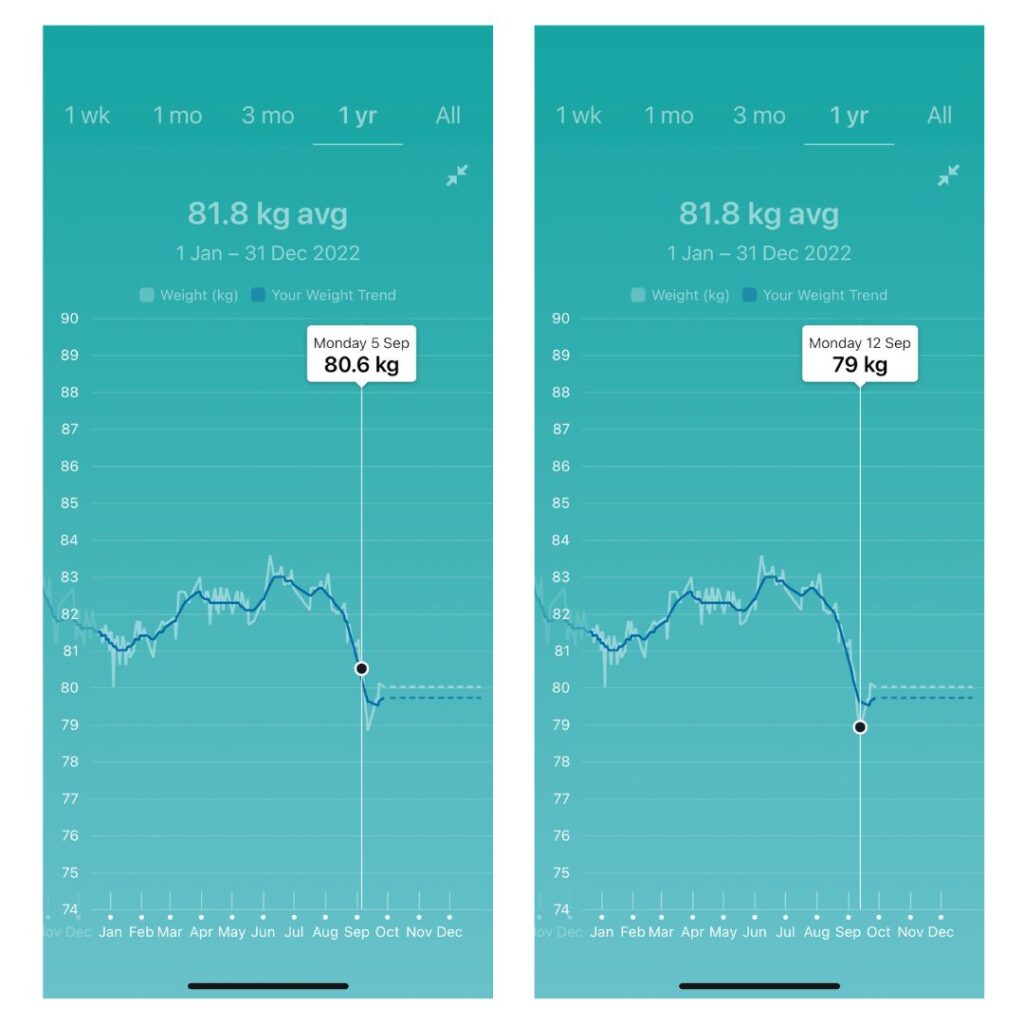- How Much Weight Can You Realistically Lose in 3 Months? - January 14, 2024
- How To Lose 1kg a Week (Guaranteed) - August 20, 2023
- How To Count Calories (or Estimate) and Stay on Track When Eating Out at Restaurants - July 25, 2023
Quick Answer
Most recommendations state that 4-8lbs of weight loss per month, or 1-2lbs of weight loss per week is healthy and sustainable but you can go quicker than that for short periods of time. I lost 3.5lb in a week.
I get it.
You want to lose weight as quickly as possible.
You’ve probably got a holiday, or a wedding, or something coming up that you’d like to look a bit better for, and you want to know how much weight you can lose in a week.
You’ve left it til the last minute and you’re panicking.
Well, I have some good news and some bad news.
The good news is that you can stop panicking.
The bad news is that the amount of weight the average person can lose in a week, isn’t going to make a noticeable difference to your physique.
But you still want to know.
Let’s get into it…
What Does The Science Say?
My personal view is that the average person should look to lose between 0.5-1.5% of their body weight per week.
That means, if you weigh 100kg, you should be aiming to lose between 0.5-1.5kg per week.
Let’s just translate that into pounds
If you weigh 220lbs, you should be looking to lose between 1.1-3.3lbs per week.
It is important to look at speed in weight loss in the context of current weight.
This is because a heavier person will be able to lose weight (and fat) more quickly than a lighter person, simply because they have more fat to lose.
In order to drop 1lb (0.45kg) in a week, you’ll need to be in a deficit of 500 calories per day (on average), that means, if you need 2000 calories a day to maintain your weight, you’ll need to eat 1,500 calories per day (on average).
If you want to lose weight more quickly, you’ll need a bigger calorie deficit, i.e, you’ll need to eat less calories!
TABLE?
But obviously, science is always right so let’s see what people that are smarter than me say.
Well, this paper agrees that most hypocaloric diets should aim for a calorie deficit of 500-750 calories per day, resulting in a weekly weight loss of 0.5kg per week
What Weight Loss Did I Lose in One Month?
I actually lost a lot more in a week than the predicted or recommended amount.
Before I go ahead and say that this was easy, or that anyone can do it; it was not and they probably couldn’t.
I wanted to drop weight quickly because I was going on holiday to Ibiza, and I knew I was going to spend a lot of time without many clothes on.
I was going with my buddy who’s also in pretty good shape so it was kind of a face-off to see who could get the leanest
So, in total, I went down from 82.2kg (181lb) to 78.9Kg (174lb) in one month (12th August to the 11th of September)
That’s a 3.3kg (7.2lb) loss in one month.
That’s exactly a 4% total loss in bodyweight or an average of 1% per week.
That’s a LOT – way more than the recommended 0.45kg (1lb per week) or 1.8kg (4lbs) per month
So how was I able to do this?
Well, I created a large calorie deficit. To be precise, I would have been in a deficit of around 847 calories per day (on average) to achieve this amount of loss.
To put that in perspective, I probably maintain my weight at around 2,700 calories a day, so I would have been eating around 1,853 calories per day (on average).
Over 1,800 calories sounds quite doable, but remember;
- My starting weight was 83kg
- I have a high than average amount of muscle mass
- I was resistance training (weight training) around 4 days per week
- I was doing at least 7,000 steps per day
So, if you’re looking at that 1,800 calorie figure and thinking “bloody hell, I could stick to that easily”, be mindful about your current weight, muscle mass and activity levels.
If you’re a very inactive person with little muscle and an already low body weight, you’ll need to go MUCH lower on your calories to produce a similar rate of weight loss.
The positive is that I wasn’t eating dust and living in the gym during that month.
I still managed to;
- Fit in some alcohol (beer)
- Go out for some high-calorie food (breakfast, Indian food)
- Slob in front of the TV with Popcorn
- NOT do any sweaty, tiring HITT workouts
This was the result…
So in summary, the amount of weight you can lose isn’t capped at an arbitrary ‘1lb per week’, you can lose a lot more than that, BUT it all comes down the number of sacrifices you’re prepared to make.
If you want to lose weight more quickly (e.g. 2lbs per week), you’ll need to;
- Exercise more intensely and more often and/or do more steps
- Remember that more exercise or steps means a bigger time commitment – you’ll have less time to binge on Netflix and Tiktok
- Miss out on ore high-calorie food intake episodes
- Feel hunger at some points
- Either miss out on social events, or limit your alcohol/food intake at these events
Of course, we all want to lose weight as quickly as possible, but we don’t all necessarily make all of these sacrifices, so be aware of what you’re letting yourself in for.
And How Much Weight Did I Lose In a Week?
As you can probably see, my weight loss over that period wasn’t linear.
It started off pretty slow then really accelerated in the final week
If you look at the graph, you’ll notice that things really sped up in the final week, and that was intentional, I wasn’t where I wanted to be so I had to take action.
In the last week (5th-12th September, I lost 1.6kg (3.5lbs).

That is way faster than the recommended rate of loss, in fact it’s 3.5x times faster than what’s recommended.
But did I die?
No
Did I get malnourished and lose a ton of muscle?
Also no.
So it is possible to lose weight much more quickly, but it’s also a lot more difficult.
Did I Lose Weight Without Losing Muscle?
It’s impossible to say for sure.
In order to get a truly accurate picture of muscle vs body fat ratio, something like a Dexa scan is required.
This involves traveling to a specialist lab and paying lots of money, and I don’t care enough to do either of those things.
Having said that, I’m confident I retained the vast majority of my muscle tissue and only lost fat.
My lifts in the gym did go down a bit, but this was probably down to me eating fewer calories and having less energy rather than having lost any muscle.
I didn’t notice my clothes sitting any differently so the likelihood is that no, I didn’t lose any muscle.
In addition this study states that, during a weight loss phase, “Caloric intake should be set at a level that results in bodyweight losses of approximately 0.5 to 1%/wk to maximize muscle retention”
I get the anxiety people have around losing muscle; it’s takes a long time and a lot of effort to build in the first place, but my stance on cutting is; the quicker you do it, the sooner you can get back to being at maintenance calories (or in a slight surplus) and building muscle again.
So How Much Did My Bodyfat Percentage Go Down?
Again, I don’t know for sure.
In my opinion, measuring body fat is futile because all the easily-available methods (e.g. calipers, bioelectrical impedance scales) so so inconsistent and likely inaccurate.
Even if I did know my exact body fat %, it wouldn’t change anything, my approach would have been exactly the same.
We can make some assumptions based on the numbers though;
If I was 15% body fat when I started at 82.2kg (181lb) and I got down to 78.9Kg (174lb), that means I lost 3.3kg (7.2lb).
At 15% body fat, I would have had 12.3kg (27lb) of body fat.
If I ONLY lost body fat, that means I would have ended up with 9kg (20lb) of body fat at the end.
At a weight of 78.9Kg (174lb), that means I ended up with 11.4% body fat.
In reality, I would have lost some water and muscle glycogen, so as an educated guess I reckon I would have been around 12-13% body fat.
That means I would have dropped 2-3% body fat. Doesn’t sound like much, but it makes a big difference.
Was It All Belly Fat?
Once again, impossible to tell.
It’s highly unlikely since when you lose body fat, it comes from all over the body, not just your belly region.
Losing belly fat does of course look impressive because it’ll reveal your abs, and my abs definitely did become more prominent, so some of it would have almost definitely been belly fat, but not all.
Again, this is another thing you simply shouldn’t worry about.
You can’t control where you lose fat from, so just focus on losing fat and you’ll see some nice differences all over your body.
If you have a lot of belly fat, the problem is not belly fat per se, just that you have too much fat overall.
Tips For Successful Weight Loss
It’s really easy to just say ‘be in a calorie deficit, but that doesn’t help you much.
You need to know how to practically maintain that deficit for long enough to lose a significant amount of weight.
With that in mind, these are a few things I did to ensure I kept dropping weight fast and consistently;
Accept Hunger 😩
Hunger is very difficult to ignore, but you will experience hunger if you’re losing weight quickly. I deal with it by imagining hunger as a signal that my body is starting to burn fat, and it’s telling me it would rather get those calories from extra food. Sorry body, can’t fool me!
Go to bed early 🛌
Not only will going to bed early mean you get more sleep (never a bad thing), it also means you have to make more effort to go to the kitchen and grab snacks during the prime grazing time
Understand you need to Make Sacrifices 🐑
You can’t lose lots of weight, AND eat takeaways, AND go out and drink AND go for dinner, AND be lazy every night. Something has to give. Your success will depend on how many sacrifices you’re willing to make. Remember, these sacrifices are only short term
Walking is your Friend 🚶🏼♂️
Walking is such a great way to help you lose fat. It’ll help you create a calorie deficit, it’s easy, you can catch up on Podcasts and it’s free. Set an achievable step goal and stick to it. Religioulsy
Keep the end goal in mind 🥅
Dieting isn’t easy, which is why so many people fail at it. But is simple. You just need to consistently execute the process. Keep your end goal in mind because it’ll motivate you. Mine was being ripped on the beach in Ibiza. If you don’t have one, you’ll probably fail.
Summary
The recommended rate of weight loss is around 1-2lbs (0.45-0.9kg) per week, however, as I’ve shown, you can go quite a lot quicker than that if you want to, it just means making more sacrifices.
If you have a lot of weight to lose, a week or a month is nowhere near long enough to see tangible, visible results, you need to be looking at the 6-12 month mark to really make a difference.
Start now, get down to a decent weight, then you can look at dieting for months or a few weeks to really sharpen up.
References
Defining the Optimal Dietary Approach for Safe, Effective and Sustainable Weight Loss in Overweight and Obese Adults: https://www.ncbi.nlm.nih.gov/pmc/articles/PMC6163457/
Evidence-based recommendations for natural bodybuilding contest preparation: nutrition and supplementation: https://www.ncbi.nlm.nih.gov/pmc/articles/PMC4033492/


Leave a Reply